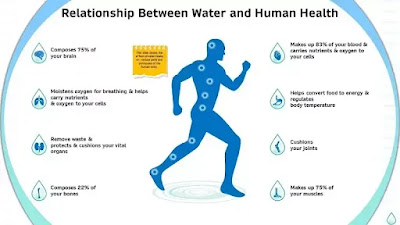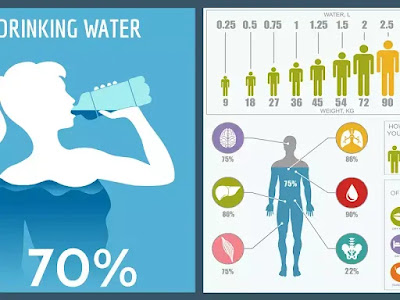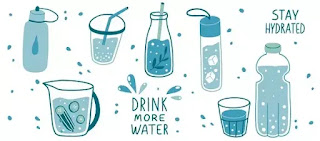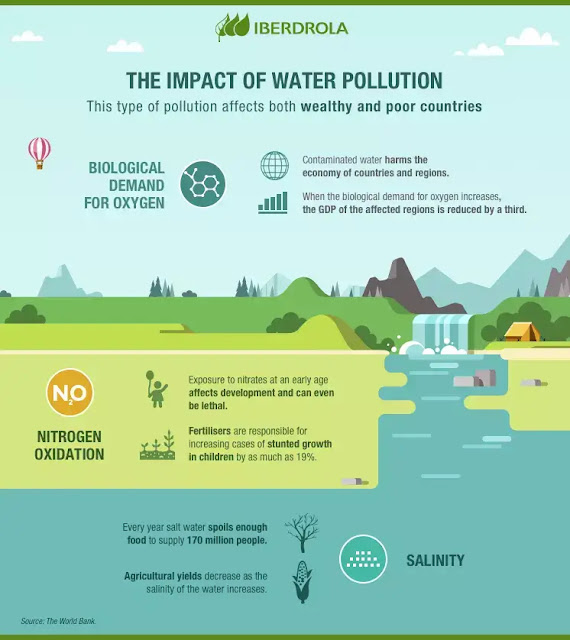Water is essential for life on Earth, and it is critical to human health, the environment, and the economy. In this article, we will explore the benefits of water, including its impact on our health, the environment, and the economy.
I. Health Benefits of Water
Water is vital for our body to function correctly, and it has many health benefits. Here are some of the ways water affects our body and its importance for hydration:
How water affects our body
Water plays a crucial role in various bodily functions, including regulating body temperature, transporting nutrients and oxygen to cells, and removing waste products from the body. Our body is made up of around 60% water, and it is vital to maintain the right balance of water to keep our body functioning correctly.
The importance of hydration
Hydration is essential for our health, and not drinking enough water can lead to dehydration. Dehydration occurs when the body loses more water than it takes in, and it can be caused by factors such as sweating, vomiting, and diarrhea. Symptoms of dehydration can include headaches, dizziness, dry mouth, and fatigue.
Drinking enough water is essential to maintain proper hydration levels in our body. It is especially important to drink enough water during hot weather or when engaging in physical activities that cause sweating.
How much water should we drink per day
The amount of water each person needs can vary depending on factors such as age, gender, and activity level. However, a general guideline is to drink at least eight glasses of water per day. This amount can vary depending on a person's individual needs, and it is best to consult a doctor or a nutritionist for personalized recommendations.
It is also important to note that other beverages, such as tea and fruit juice, can contribute to a person's daily fluid intake. However, it is best to limit the consumption of sugary drinks as they can lead to health problems such as obesity and diabetes.
Benefits of drinking enough water
Drinking enough water can have many benefits, including maintaining healthy skin, aiding in digestion, improving brain function, and reducing the risk of chronic diseases. Here are some of the benefits of drinking enough water:
- Maintaining healthy skin: Water is essential for maintaining skin hydration and elasticity. Drinking enough water can help prevent skin dryness and wrinkles.
- Aiding in digestion: Water plays a crucial role in digestion, helping to break down food and transport nutrients to the body. Drinking enough water can help prevent constipation and other digestive problems.
- Improving brain function: Water is important for brain function, and dehydration can lead to cognitive impairment. Drinking enough water can improve mood, concentration, and overall cognitive performance.
- Reducing the risk of chronic diseases: Drinking enough water has been associated with a reduced risk of chronic diseases such as heart disease, kidney disease, and diabetes.
Health risks of dehydration
Dehydration can have severe health consequences, including kidney damage, seizures, and even death. Here are some of the health risks associated with dehydration:
- Kidney damage: Dehydration can cause a buildup of waste products in the body, leading to kidney damage and other health problems.
- Seizures: Severe dehydration can cause electrolyte imbalances in the body, leading to seizures.
- Heat exhaustion and heatstroke: Dehydration can cause heat exhaustion and heatstroke, which can be life-threatening.
- Impaired cognitive function: Dehydration can impair cognitive function, leading to confusion, irritability, and other cognitive problems.
How to stay hydrated
It can be challenging to remember to drink enough water throughout the day, but there are some tips and tricks to help stay hydrated:
- Keep a water bottle with you at all times: Having a water bottle with you can help remind you to drink water throughout the day.
- Set reminders: Setting reminders on your phone or computer can help remind you to drink water regularly.
- Eat water-rich foods: Foods such as watermelon, cucumbers, and tomatoes contain high amounts of water and can help contribute to your daily fluid intake.
- Drink water before and after physical activity: Drinking water before and after physical activity can help prevent dehydration and aid in recovery.
- Drink water with meals: Drinking water with meals can help with digestion and prevent overeating.
Effects of drinking too much water
While it is essential to stay hydrated, it is also possible to drink too much water, which can lead to a condition called hyponatremia. Hyponatremia occurs when the body's sodium levels become too diluted, leading to symptoms such as nausea, headache, and confusion.
It is rare for healthy individuals to develop hyponatremia, but it can be a risk for athletes who consume large amounts of water during intense physical activity. It is important to listen to your body's signals and not force yourself to drink more water than you need.
Water is essential for our body's proper functioning, and it has many health benefits. Drinking enough water can help maintain healthy skin, aid in digestion, improve brain function, and reduce the risk of chronic diseases. It is essential to stay hydrated by drinking enough water and other fluids, especially during hot weather or when engaging in physical activities. However, it is also important not to overdo it and listen to your body's signals.
II. Environmental Benefits of Water
Water conservation
Water conservation is the practice of using water efficiently to reduce waste and preserve freshwater resources. Here are some ways to conserve water:
- Fix leaks: Fixing leaks in pipes, faucets, and toilets can save significant amounts of water.
- Use water-efficient appliances: Using water-efficient appliances, such as low-flow showerheads, toilets, and washing machines, can significantly reduce water usage.
- Water plants efficiently: Watering plants during the early morning or late evening when temperatures are cooler can reduce water loss due to evaporation.
- Collect and reuse rainwater: Collecting rainwater can provide a free source of water for outdoor plants and activities.
Preserving freshwater resources
Freshwater resources are finite and essential for human survival. Here are some ways to preserve freshwater resources:
- Protect wetlands and riparian areas: Wetlands and riparian areas act as natural filters for water and help to replenish groundwater resources.
- Use water-efficient irrigation methods: Using water-efficient irrigation methods, such as drip irrigation, can reduce water loss due to evaporation and runoff.
- Reduce runoff: Reducing runoff by implementing green infrastructure, such as rain gardens and permeable pavement, can help recharge groundwater resources.
Effects of water pollution on the environment
Water pollution can have devastating effects on the environment, including:
- Harm to aquatic life: Water pollution can harm aquatic life by disrupting ecosystems, reducing oxygen levels, and introducing harmful substances.
- Contamination of drinking water sources: Water pollution can contaminate drinking water sources, leading to serious health risks for humans and animals.
- Harm to recreational activities: Water pollution can make water bodies unsafe for swimming, boating, and fishing, leading to a decline in recreational activities.
Ways to prevent water pollution
Preventing water pollution is essential to preserve freshwater resources and protect the environment. Here are some ways to prevent water pollution:
- Properly dispose of hazardous materials: Hazardous materials, such as batteries, oil, and chemicals, should be disposed of properly to prevent contamination of water sources.
- Reduce fertilizer use: Excess fertilizer use can lead to runoff into water bodies, causing harmful algal blooms and other forms of water pollution.
- Properly maintain septic systems: Proper maintenance of septic systems can prevent leaks and contamination of groundwater resources.
Water is essential for the environment and all living organisms. Conserving and preserving freshwater resources is vital to ensure that future generations have access to clean water. Preventing water pollution through proper disposal of hazardous materials, reducing fertilizer use, and proper maintenance of septic systems can help protect freshwater resources.
III. Economic Benefits of Water
Water plays a significant role in the economy, from agriculture to industry. In this section, we'll explore the economic benefits of water in more detail.
Importance of water in agriculture
Agriculture is one of the largest water-consuming sectors globally, accounting for over 70% of freshwater usage. The efficient use of water in agriculture can be a game-changer, increasing productivity, reducing input costs, and improving livelihoods. Here are some ways water is important in agriculture:
- Crop irrigation: Irrigation is essential for crop growth, and the use of efficient irrigation methods can increase crop yields and reduce water usage. Effective irrigation techniques like drip irrigation, sprinkler irrigation, and micro-irrigation can help save water while maintaining crop yields. Irrigation also contributes to maintaining soil moisture and nutrient levels, thereby ensuring healthy and high-quality crops.
- Livestock watering: Livestock require significant amounts of water for drinking, and proper water management can improve livestock health and productivity. Animal welfare is paramount for farmers, and providing clean and safe drinking water is a critical component. Poor water quality can cause livestock to become ill and unproductive, leading to economic losses for farmers.
- Soil management: Water is essential for soil health, and proper water management can help maintain soil fertility and reduce soil erosion. Soil water content influences plant growth and the uptake of essential nutrients. Water management techniques like rainwater harvesting, cover crops, and mulching can contribute to maintaining soil moisture, reducing soil erosion and compaction, and improving soil quality.
Role of water in industries
Water is essential for many industries, including manufacturing, energy, and transportation. Industries rely on water for a range of processes, from cooling to cleaning and sanitation. Here are some ways water is used in industries:
- Cooling: Water is used for cooling purposes in many industries, such as power generation and manufacturing. The cooling process involves the transfer of heat from the process to the cooling medium, which is often water. However, cooling towers and other cooling systems require a significant amount of water, and improving water-use efficiency in these processes can help reduce water consumption and costs.
- Cleaning and sanitation: Water is used for cleaning and sanitation purposes in many industries, such as food processing and healthcare. The use of clean and safe water is essential for hygiene and preventing the spread of infectious diseases.
- Product processing: Water is used in product processing, such as in the production of beverages, paper, and textiles. The quality of the water used in processing can affect the quality of the product, and proper water treatment is necessary to ensure high-quality end products.
Economic impact of water scarcity
Water scarcity can have significant economic impacts, such as:
- Reduced agricultural productivity: Water scarcity can lead to reduced crop yields, impacting food security and increasing food prices. In regions where agriculture is a major economic activity, reduced productivity can lead to reduced incomes and increased poverty levels.
- Increased energy costs: Water scarcity can increase energy costs for industries that rely on water for cooling and other processes. In areas where water resources are limited, industries often have to incur additional costs to source and transport water, leading to increased production costs.
- Economic losses due to water-related disasters: Water-related disasters, such as floods and droughts, can cause significant economic losses due to damage to infrastructure and property. These losses can impact the economy at the local, regional, and national levels, leading to reduced economic growth and increased poverty levels.
IV. Cultural and Social Significance of Water
Water holds cultural and social significance across the world, from religious ceremonies to community gatherings. In this section, we'll explore the cultural and social significance of water in more detail.
Water in different cultures and traditions
Water holds a special place in many cultures and traditions worldwide. It is often regarded as a symbol of purity, renewal, and life. Here are some examples of the cultural significance of water in different parts of the world:
- Hinduism: In Hinduism, water is considered sacred and is used in many religious ceremonies. The River Ganges is regarded as a holy river, and millions of Hindus make pilgrimages to its banks to purify themselves.
- Christianity: Water is an essential element in Christianity and is used in many sacraments, such as baptism, which symbolizes the washing away of sin and rebirth.
- Indigenous cultures: Water plays a central role in many indigenous cultures worldwide. In some cultures, water is believed to have healing properties, and people use it for purification and cleansing rituals.
- Japanese culture: In Japan, water is revered for its purifying properties and is used in many religious and cultural ceremonies, such as the tea ceremony.
The importance of water in communities
Water is not only essential for human survival, but it is also critical for building and sustaining communities. Here are some ways in which water is important for communities:
- Access to clean water: Access to clean and safe water is crucial for maintaining public health and preventing the spread of water-borne diseases. Communities without access to clean water are at risk of illness and death, particularly in areas where water resources are scarce.
- Economic development: Water is essential for economic development, particularly in areas where agriculture is the primary economic activity. Efficient use of water resources can increase agricultural productivity, leading to increased incomes and improved livelihoods.
- Social cohesion: Water can also serve as a unifying force in communities, bringing people together for social events and activities. Water-related activities, such as swimming, fishing, and boating, can foster social connections and promote community cohesion.
Water as a symbol of life and renewal
Water is often used as a symbol of life and renewal, representing the cycle of birth, death, and rebirth. Here are some examples of how water is used as a symbol of life and renewal:
- Spring festivals: Many cultures celebrate spring festivals, which often involve water-related rituals and traditions. For example, in India, the festival of Holi involves throwing colored water at each other to celebrate the arrival of spring.
- Healing and purification: Water is often used for healing and purification purposes in many cultures. For example, some cultures believe that bathing in natural springs or rivers can have healing properties and can help purify the body and mind.
- Spiritual significance: Water also holds spiritual significance in many cultures, representing the divine and the sacred. Water is often used in religious ceremonies and rituals, such as baptism, to symbolize spiritual cleansing and rebirth.
V. Conclusion
In conclusion, water is a vital resource that plays a crucial role in human health, the environment, the economy, and cultural and social traditions worldwide. In this article, we explored the various benefits of water, including its health benefits, environmental benefits, economic benefits, and cultural and social significance. We also discussed the importance of preserving and conserving water resources to ensure sustainable development and maintain access to clean and safe water for all. We hope this article has highlighted the importance of water and has inspired you to take action to protect and conserve this precious resource.
As we have seen, water is essential for life, and its value extends beyond its role in sustaining our bodies. Water also plays a vital role in sustaining our communities, economies, and cultural and social traditions. However, despite its importance, water resources around the world are under threat from pollution, climate change, and overuse. Therefore, it is essential that we take action to protect and conserve water resources for present and future generations.
Here are some actionable steps we can take to conserve and protect water resources:
Reduce water use: One of the most effective ways to conserve water is to reduce our water use. We can do this by fixing leaks, taking shorter showers, and using water-efficient appliances.
- Conserve freshwater resources: Freshwater resources are finite, and their availability is under threat from pollution and overuse. We can conserve freshwater resources by using water-efficient irrigation systems, reducing water waste, and protecting wetlands and other natural water sources.
- Prevent water pollution: Water pollution is a significant threat to water resources worldwide. We can prevent water pollution by properly disposing of hazardous materials, reducing the use of pesticides and fertilizers, and supporting policies and regulations that protect water quality.
- Support sustainable agriculture: Agriculture is a significant user of water resources and a significant contributor to water pollution. We can support sustainable agriculture practices that use water more efficiently, reduce water waste, and protect soil and water quality.
- Advocate for policies that protect water resources: We can support policies and regulations that protect water resources and ensure access to clean and safe water for all. This can include supporting water conservation and management programs, advocating for sustainable water use practices, and holding polluters accountable for their actions.
In summary, water is a precious resource that is essential for sustaining life, communities, and ecosystems. We must take action to conserve and protect water resources to ensure that we maintain access to clean and safe water for all. By reducing water use, conserving freshwater resources, preventing water pollution, supporting sustainable agriculture, and advocating for policies that protect water resources, we can help ensure a sustainable future for ourselves and future generations.












0 Comments